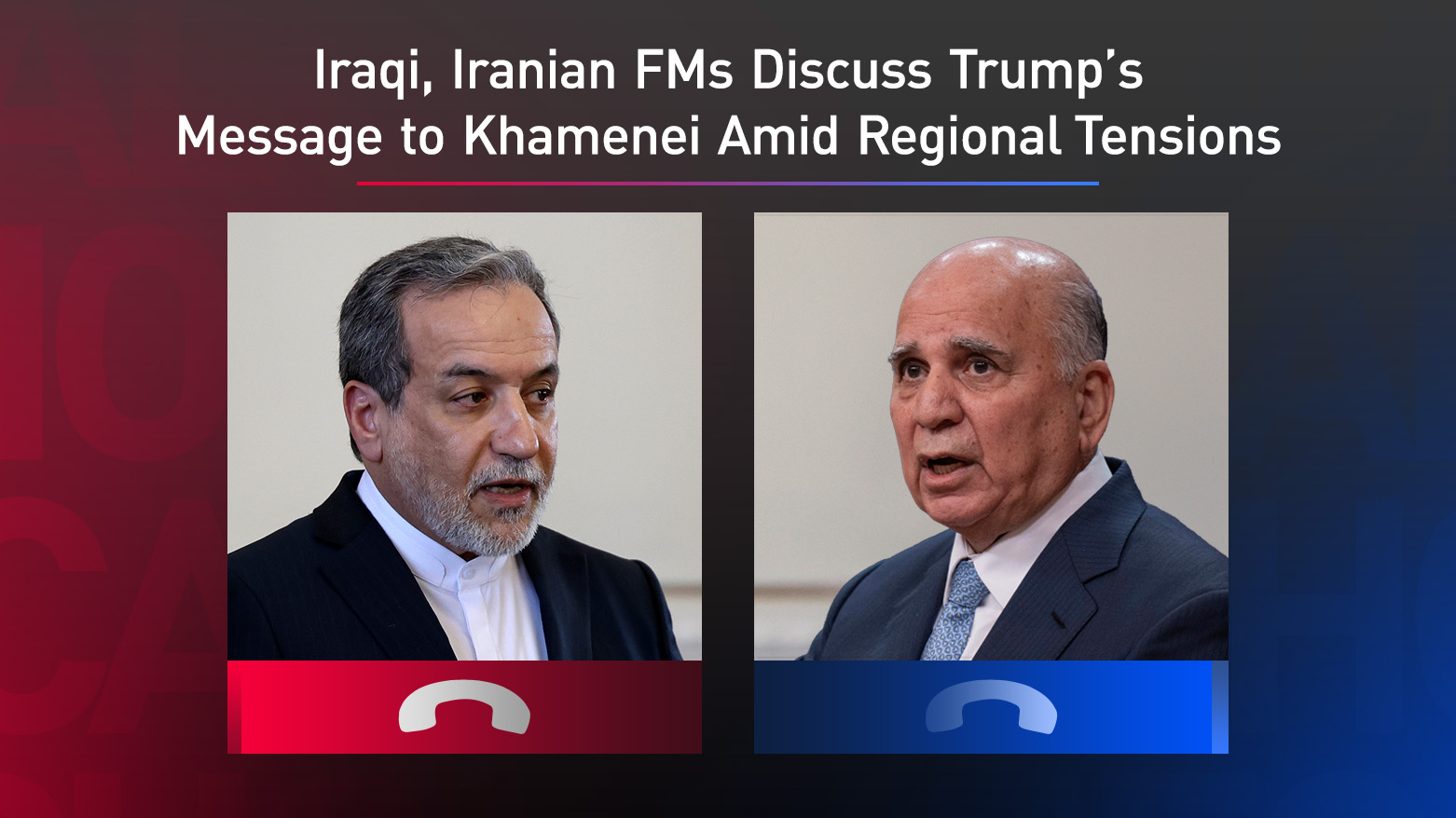Iraqi, Iranian FMs Discuss Trump’s Message to Khamenei Amid Regional Tensions
Iraqi Foreign Minister Fuad Hussein welcomed Iran’s disclosure as a step toward transparency and expressed hope it could open the door to broader U.S.-Iran dialogue.

By Kamaran Aziz
ERBIL (Kurdistan24) – Iraq’s Foreign Minister Fuad Hussein and his Iranian counterpart Abbas Araghchi held a phone call on Monday, during which Araghchi disclosed the contents of a message sent by U.S. President Donald Trump to Iran’s Supreme Leader Ayatollah Ali Khamenei.
The letter, aimed at reopening nuclear negotiations, has injected new dynamics into the already volatile U.S.-Iran relationship.
The conversation, confirmed by Iraq’s Ministry of Foreign Affairs, comes at a time of escalating tensions in the Middle East.
According to Araghchi, Trump’s letter proposed renewed dialogue over Iran’s nuclear program but was accompanied by warnings of possible military action should diplomacy fail.
Trump’s message, first acknowledged in a Fox News interview, was reportedly delivered to Tehran via Emirati diplomatic channels. Despite initial denials, Iranian sources later confirmed receiving the letter, which they said largely repeated Trump’s public positions.
Read More: Trump Says He Offered Iran Restart of Nuclear Talks; Tehran Denies Receiving Proposal
Iran has remained publicly defiant. In response to the message, Khamenei and Iranian President Masoud Pezeshkian reiterated Tehran’s refusal to negotiate under threat or coercion. Khamenei declared that “calls for negotiations by bullying powers are not aimed at resolving issues; rather, they are an attempt to impose their demands on the Islamic Republic.” Pezeshkian echoed the sentiment, calling for internal unity to resist foreign pressure.
Read More: Khamenei Defies as Trump Threatens Military Action Over Nuclear Standoff
Iraq’s Foreign Minister Fuad Hussein welcomed the Iranian disclosure, viewing it as a constructive step toward transparency and potential dialogue. He expressed hope that such an exchange could pave the way for broader diplomatic engagement between Washington and Tehran.
As a country with strategic ties to both capitals, Iraq reaffirmed its readiness to act as a facilitator in efforts to ease regional tensions.
The exchange comes amid a reactivation of Trump’s “maximum pressure” policy on Iran, including new rounds of sanctions targeting Iranian oil exports and affiliated entities. U.S. officials, including National Security Adviser Mike Waltz, have insisted that Iran must fully dismantle its nuclear program, warning of “dire consequences” if it continues enrichment.
Read More: U.S. Warns Iran: ‘Give Up Nuclear Program or Face Consequences’
Trump himself has reiterated that military options remain on the table, despite also signaling a desire for diplomacy.
Read More: Envoy Signals U.S. Interest in Iran Talks to Avoid War
Tensions have been further inflamed by recent U.S. airstrikes on Iranian-backed Houthi militants in Yemen, who have launched multiple attacks on shipping in the Red Sea. Trump warned Iran to cease support for the Houthis and other proxies or face severe retaliation. Iranian officials, including Foreign Minister Araghchi and military commanders, responded by vowing to resist any American aggression and maintain support for regional allies.
The Trump administration has also re-imposed heavy sanctions on a network facilitating covert Iranian oil sales, particularly involving Chinese “teapot” refineries and shadow fleet vessels. These efforts are part of a broader U.S. campaign to cut off Iran’s revenue sources and block its path to nuclear weapons capability.
Read More: US Imposes Fourth Round of Sanctions against Iran Oil Exports
Amid this high-stakes standoff, the phone call between the Iraqi and Iranian foreign ministers serves as a critical diplomatic gesture. The ministers also discussed regional flashpoints in Gaza, Lebanon, and Yemen.
As Baghdad continues to host indirect dialogues and backchannel diplomacy, its role as a mediator may become increasingly vital. Whether Trump’s overture and Iraq’s involvement can produce substantive diplomatic progress remains to be seen, but the groundwork for dialogue appears to be cautiously taking shape, even as the threat of military escalation looms large.